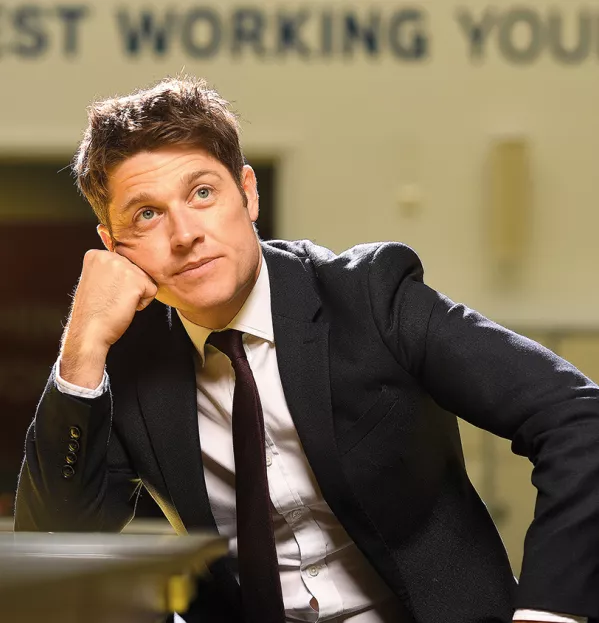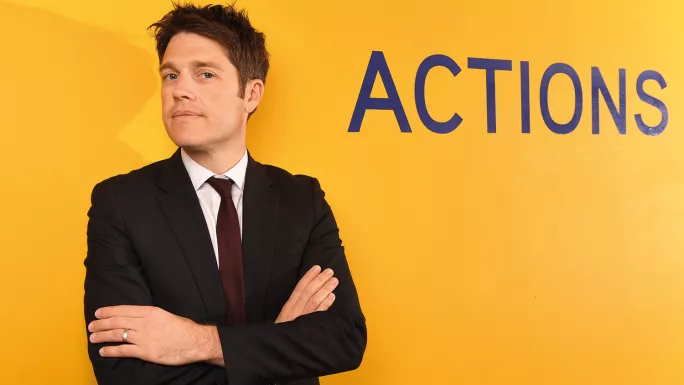‘I learned the hard way the importance of keeping things simple’

On a quiet street in a deprived inner-city neighbourhood, a poster is attached to a metal fence, which urges young people to believe they are destined for university.
The children in a playground on the other side are only five years old but their school already wants them to think big. The fence, in Chapeltown, Leeds, belongs to the latest Dixons Trinity school, where executive principal Luke Sparkes is planning to transform the lives of local children.
It is one of a series of positive messages running alongside the outside of the school promoting his vision of a high expectation culture for pupils, regardless of what their background may be.
Sparkes is the man behind what is arguably one of the biggest success stories of the free school programme and someone who is committed to raising the life chances of disadvantaged children in the north.

As founding principal of the Dixons Trinity Academy, in Bradford, he helped open the school in 2012 and led it to become the first secondary free school in the country to be rated as outstanding two years later.
Its first GCSE results last summer saw it achieve the best Progress 8 score for pupils from deprived backgrounds nationally. Headteachers from across the country now flock to Bradford to learn lessons about the results that Sparkes has achieved.
Pure and simple
But speaking to Tes from the temporary building of the trust’s latest school, he almost downplays the success, stressing that his school is not revolutionary.
“We just focus on keeping things simple and doing them really well,” he says.
The 39-year-old has looked to apply approaches he has learned from other schools and leaders throughout his career.
He is a product of the Future Leaders programme - a government-backed scheme aimed at developing talented headteachers for schools in disadvantaged areas - and someone who has been inspired by the charter school movement in the US.
But it was not always Sparkes’ burning ambition to become a teacher or a school leader. Having graduated with a geography degree from the University of Manchester, he decided to go travelling.
“As a geography student, I loved seeing and learning about different places and so fell in love with travelling,” he says. “When I graduated, I was very keen to go away.”
He returned home because he was running out of money and struggling to find work.
“At that time they were offering bursaries to do PGCEs so I decided to do this.
“I had thought that this would give me time to think about what I wanted to do and would help me find work if I went back travelling.”
Instead, it launched Sparkes on a fast-track career to the top of the teaching profession.
Having trained in Leeds, he began his career at Corpus Christi Catholic College in the city as a geography teacher before joining Dixons City Academy, in Bradford, as head of geography. Dixons was originally a city technology college and had become one of the country’s first academies.
“Dixons has always been cutting edge,” Sparkes says, “so this was a big move for me.”
Growing up near Liverpool, Sparkes is a big Everton fan. He laughs as he recalls how his colleagues in Leeds compared his move to Dixons to that of Wayne Rooney, as a rising star, leaving the Merseyside football team to join Manchester United.
After four years at Dixons City, Sparkes was looking for a new challenge and found it in the Future Leaders programme, which was running a course in the north for the first time.
It meant having to give up his job to do a year’s residency at another school. But this decision helped to shape his career and ignited his desire to be a school leader.
The inspiration, he says, came from the Future Leaders training provided by the programme’s co-founder, Sir Iain Hall, and Jay Altman, who now runs charter schools in New Orleans.
“You had intensive training around everything, but the most life-changing moment - the career changing moment - was that first weekend on Future Leaders, led by Jay, who had been director of education for Ark but was an American and had gone back to New Orleans to run an organisation called Firstline Schools.
“He delivered this one weekend on school culture and it was just mind-blowing. At that time, there were not really any schools in challenging circumstances doing anything around culture like that in the way some of these American schools were.”
A few months later, Sparkes had the opportunity to travel to New York to see some charter schools in action, such as Kipp, Uncommon Schools and Achievement First. It changed his vision of education.
“They did sweat the small stuff and expectations were really high. I know people talk about this a lot but their expectations of pupils were incredibly high.”
He has looked to create this at Dixons Trinity but he is aware that, for some, the idea is contentious. “I think people get hung up on the idea that high expectations and no excuses is a problem because, actually, sometimes a child might have an excuse for X,Y or Z.
“I think what we are really talking about is that, as staff, we are not going to make excuses for results based on a child’s background.”
Sparkes, a father of three, is keen to stress that this is because the school cares about the pupils. “We have very high expectations, yes, but it’s also very loving. It’s tough, but it’s tough love. It’s just like what any good parent does. You have strong routines and you keep to those routines, otherwise you know what is going to happen.”
During his Future Leaders residency year, Sparkes was placed at Mossley Hollins High School, in Tameside, and says he was lucky to have a headteacher in Drew Duncan, who had also been on the programme as a senior adviser and was looking to implement some of what they had seen in the US.
However, he has also learned lessons about leadership “the hard way”.
After Future Leaders came a dose of reality in his role as assistant principal at the former Rhodesway School, an inner city school in Bradford that had been in special measures and was being taken over by Dixons.
The change in Sparkes’ tone as he talks about it shows that this was a different experience. “I learned more about myself and my leadership there than anywhere else,” he says.
When asked to expand, he gives a surprising answer. “Through the mistakes I made. There was a lot of challenges and I did things in terms of initiatives that I didn’t need to try to do.There was probably an element of initiative overload and I was part of that.
“From where I had worked previously, I had not thought about where the school was at and what I needed to prioritise. So I learned the hard way about the importance of keeping things simple.”
Having worked in a turnaround school, Sparkes then had the chance to start one from scratch. Sir Nick Weller, the chief executive of Dixons Academies, invited him to help write the free-school bid for Dixon’s Trinity. After it got the green light, he was made headteacher.
Sparkes acknowledges that starting a school with a blank sheet has its advantages, saying that staff have been able to instil the right culture in the school from day one.
“It’s much easier with a school of 112 kids and 10 staff,” he says.
Dixon Trinity’s values are hard work, trust and fairness. And Sparkes says there is a focus on three “drivers” for pupils: mastery (practising to get better, autonomy), pupils being able to shape their own lives, and purpose (for children to connect to a cause larger than themselves).
This might all sound very familiar to school leaders. And Sparkes is the first to admit that Dixons Trinity is not doing things that are new.
However, he suggests its success is down to the fact that these values are not just strong words but underpin everything the school does. “We have made going to university a very explicit focus,” he says. “Right from reception age, we talk about climbing the mountain to university, which is something we got from charter schools in America. We like that metaphor - we use it a lot.”
On transition days, when primary school pupils arrive at Dixons Trinity, the first thing they do is get on a bus to the University of Leeds. “I want those children to experience what I experienced as an 11-year-old dropping off my brother at university for the first time.
“I still remember it to this day. He was the first person in my extended family to go to university and I knew, from that moment on, that this was where I would go.”
That’s my goal
Sparkes is now setting his sights on expanding Dixons Trinity but he also talks about a broader goal - helping to tackle educational disadvantage in the north. When Sparkes addresses this, it sounds like a personal mission. He grew up in St Helens and described his parents as having come from a deprived working-class background.
“The north is important to me. People always comment on my accent. I had the chance to go to London but I have always worked in the north.”
Although Dixons Trinity is already in the limelight, Sparkes believes that more needs to be done to raise the profile of northern schools. And he is concerned that there is not enough in place to allow teachers with the potential to be great leaders to follow in his footsteps.
“We need to find high-potential people. The Future Leaders programme now is for people who are two years from headship, so it’s looking for high-performing deputies.
“But where are the programmes developing people like I was?”
He believes this is what the north needs to develop teachers and raise standards.
“We need to challenge teachers to be ambitious for what children can achieve because it is possible for children from challenging parts of the country to compete with those children who got to top state or independent schools,” he says. “I think we have proved this at Dixons Trinity because we have just done it.”
You need a Tes subscription to read this article
Subscribe now to read this article and get other subscriber-only content:
- Unlimited access to all Tes magazine content
- Exclusive subscriber-only stories
- Award-winning email newsletters
Already a subscriber? Log in
You need a subscription to read this article
Subscribe now to read this article and get other subscriber-only content, including:
- Unlimited access to all Tes magazine content
- Exclusive subscriber-only stories
- Award-winning email newsletters